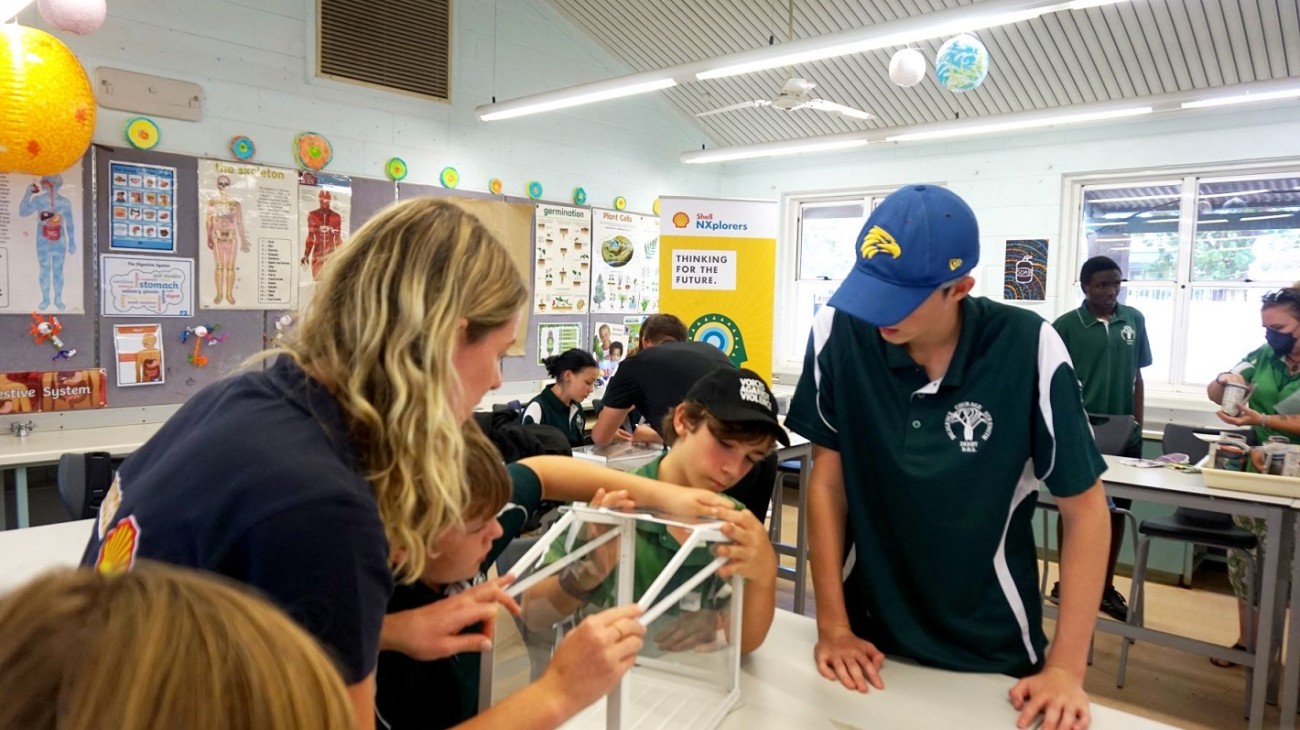Posted Tuesday, 20 May 2025
Scitech to spark science curiosity across the Kimberley
Scitech is embarking on an epic tour across the Kimberley, visiting 26 remote community schools.
High school students in Derby and Broome are using STEM skills to develop solutions to global sustainability challenges as part of the Shell NXplorers Program.

Derby District High School students building greenhouses for their experiment.
Scitech headed up to Derby and Broome in September to visit students at Derby District High School and St Mary’s College Broome to see the final stages of their projects as part of the Shell NXplorers program.
The program gives secondary students the opportunity to use STEM skills as they develop solutions to global sustainability challenges.
During a Scitech visit in June, students were tasked with exploring an issue affecting their local area and imagining different futures based on factors that affect it.
From there they picked their preferred future and came up with ways to create that change, narrowing down to one or more projects that they could work on throughout the year.
Food for thought
Derby District High School students looked at the accessibility of fresh local food, discussing the limitations of what they can grow due to climate and water and what happens to food availability during events such as a cyclone or pandemic.
For their project, they set up an experiment using mini greenhouses with parsley and bean plants, placing plants in a cupboard, in the classroom, and outside to see how the differences in light and temperature affect the plants’ growth and health.
“Students are using this experiment to think about climate and the effects that different environments have on plants, and then looking at how to design a garden in Derby – thinking about food security from the ground up,” Scitech presenter Laura Pitts said.
Beach clean
At St Mary’s College Broome, students followed the same complex thinking process focussing on litter at Broome’s Town Beach.
They decided to organise a rubbish pick-up for the day of Scitech’s visit and made posters to put up around town to advertise the event.
On the day, the students enjoyed talks from Grace Maglio from Roebuck Bay Working Group about the science of the bay and Yawuru ranger with the Department of Parks and Wildlife Jason providing a governance and cultural perspective.
Students picked which section of the beach to target before picking up rubbish for half an hour and then tipping the collected rubbish onto a tarp to sort it into different categories. Laura said a few tourists even joined in after seeing the posters and there was interest from passers-by.
“I overheard a grandma talking to her grandson about where the litter came from, like “Was it the turtles who made this mess? Was the snubfin dolphins? No, it was the humans!”
As a follow-up to the event, the students spent time talking about why the rubbish was on the beach and planned further action to help prevent it getting there in the first place.
Sustainable future
Laura said by focussing on a local issue, the program helps to empower students and show them that they can make changes towards a sustainable future.
“You find that, when they realise actually there are things they can do right now and it’s something that they do care about, they really take it on which is very cool to see. And that’s the real strength of this program – it comes from them. We come with the thinking tools and that spark of looking at issues around food, water and energy, but then everything from there is student driven.”
Upon clicking the "Book Now" or "Buy Gift Card" buttons a new window will open prompting contact information and payment details.